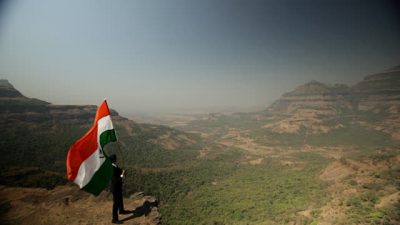By
Ananya S Guha
Patriotism is a word difficult to define or condense into a meaning or typology of it. When I or someone says that she or he is patriotic it brings to mind a love for the country, a love for everything that goes with the country. But does it bring along a sentiment that patriotism is confined only to the limits of one’s country or ethnicity?
Perhaps the more euphemistic word for this would be nationalism on which a long and tedious debate has been taking place. So a shout in praise of the country is an apposite sign of patriotism. Then one immigrates in another country and retells stories, customs and practices of his country, worships his original gods, and that also is patriotism. What is left out are beliefs of a human kind, a single entity called Man or a common humanity where suffering is the same everywhere, where poverty and hunger are spread across the world like a dreaded disease. Perhaps Tagore stopped for a while thinking on nationalism and mused on internationalism. Perhaps Bertrand Russell too dreamt of a ‘single world government’ but abandoned the idea as utopian- because the political nature of man and his moral nature are two separate identities, two separate worlds, not in harmony with one another but in a constant tiff, war or battle. The Dalai Lama recently said in a television interview that human beings are intrinsically compassionate, but their supposed intellect or intelligence cannot measure up to such compassion. So be patriotic and nationalistic and leave it at that.
So what happens in a country like India where are are contiguous forces of harmony, in terms of religion, music, food habits and culture, but there are also forces of sub nationalities, where within a broad cultural umbrage there are others who trace origins and descent in other ways? There is diversity, but what about the much talked of unity, or patriotism, where does patriotism now single down to or veer to? The assimilation of cultures, a pan Indian consciousness that we talk about, is it the same as say a pan Hindi, Bengali or Marathi culture? The focal point is culture, but when we talk about sub cultures and diversities, it is not that there is a problem at hand, but how are we mentally prepared to assimilate those broad, inchoate and amorphous cultures, into our existential souls. That will be the challenge, before snaring politicians and other go getters destroy a fabric which is a quintessence of composite cultures, and shaping of forces such as historical, geographical or migratory.
So the patriotic zeal will continue, in cricket matches, in utterances of ‘Bharat Mata Ki Jai‘, but it will not shovel out de-patriotic or nationalistic forces, or for that matter de-humanizing elements of a country or world. The time space factor of a world now abetted by technologies, is doing wonders to merge space identities, but as long as only political power is seen as the syndrome of a vision, where technology is driven to suit individual ends, then patriotism or nationalism not only become meaningless, but their one step forward to seek unification with the ‘other’ is hopelessly lost into the morass of animosities and divisions.
That is why I have often wondered when the national movement in India reached a crescendo, why men like Tagore or even Gandhi maintained reticence on some issues, issues related to self glorification, caste high handedness for example? The people are the same everywhere the Dalai Lama emphatically states, but the governments are not, they change. It is the people who matter. I may, he says have a problem with the Chinese government, but not with the people! This slice down or breakdown of what we normally call ‘truth’ is no subversive ideal, but can help us to think soberly in a balanced manner. So when we are patriotic, we should consider other patriots, then only the obverse, the reverse, and the entangled meshes of the world come into an objective whole, not jaundiced, where people of different races, or ethnicities strike us as palpably human. In our forging ahead with this furious debate on nationalism we have hectored both the past and the present. We have refused to see anyone else’s point of view except our very own, we have forgotten that there are brethren in other parts of the world who also hold us and our country with a deep sense of reverence.
So in our desire to be patriotic, we must understand the patriotism on other sides of hedges. There are people on social media networks who vociferously appeal to a oneness of humanity, perhaps they mean it earnestly, but we also know that this can be a double edged vicious sword. Today one of my friends wrote on one of these sites: ”Welcome back to the world of FB”. It was a nice feeling, a positive one, because a friend living beyond a million miles had the cognitive and rekindling spirit – the recognition of lights beyond possibilities- thanks again to this creation of a virtual world, that must cohere with the real. So in such a simple statement isn’t there a shade of reaching out, making the impossible possible, or an infinite possibility of a reality hitherto not known? It is not sure when one can meet such a friend, or will someone ever meet him, but the meeting is via an independent world, not of homilies, but self lived, self declared !



No Comments Yet!
You can be first to comment this post!